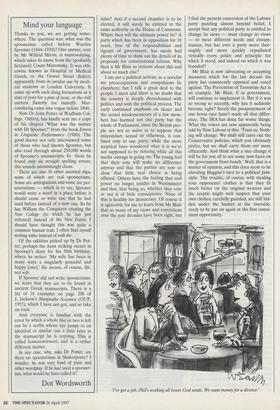Mind your language
Thanks to you, we are getting some- where. The question was: what was the spoonerism called before Warden Spooner (1844-1930)? One answer, sent by Mr Wilfrid Miron, is marrowskying, which takes its name from the (probably fictional) Count Marrowsky. It was oth- erwise known as Hospital or Medical Greek, or the Gower Street dialect, apparently from its jocular use by medi- cal students at London University. It came up with such slang formations as a stint of pout for a pint of stout, or the still current flutterby for butterfly. Mar- rowskying came into vogue before 1860.
Now Dr John Potter of Wadham Col- lege, Oxford, has kindly sent me a copy of his chapter 'What was the matter with Dr Spooner?' from the book Errors in Linguistic Performance (1980). The good doctor not only interviewed some of those who had known Spooner, but also read through about 250,000 words of Spooner's manuscripts. In these he found only six straight spelling errors; this sounds astonishingly clean.
There are also 36 other assorted slips, none of which are real spoonerisms. Some are anticipations and some are per- severations — which is to say, Spooner would write a word in a place before it should come or write one that he had used before instead of a new one. So he has William the Conqueror creating the New College (to which he has just referred) instead of the New Forest. I should have thought this was quite a common human trait. I often find myself writing withe instead of with the.
Of the oddities picked up by Dr Pot- ter, perhaps the most striking occurs in Spooner's diary for his 50th birthday, where he writes: 'My wife has been in many ways a singularly peaceful and happy [one].' He means, of course, life, not wife.
If Spooner did not write spoonerisms, we learn that they are to be found in ancient Greek manuscripts. There is a list of 16 examples on page 208 of J. Jackson's Marginalia Scaenica (OUP, 1955), which I have not got, and so take on trust.
And everyone is familiar with the error by which a whole line or two is left out by a scribe whose eye jumps to an identical or similar one a little later in the manuscript he is copying. This is called homoeoteleuton, and is a rather different matter.
In any case, why, asks Dr Potter, are there no spoonerisms in Shakespeare? I wonder; he was very fond of puns and other wordplay. If he had used a spooner- ism, what would he have called it?
Dot Wordsworth


































































 Previous page
Previous page